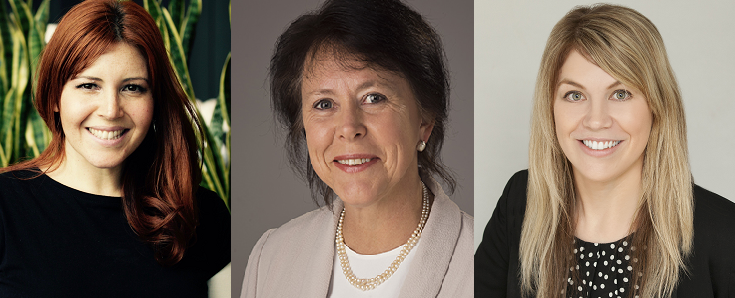INSIGHT
Reflections on COVID & culture

COVID-19 has fundamentally changed the way each of us live and work, and the recovery to rebuild economies and communities is underway. Discussions are ongoing across companies around the world on how to adapt the workforce to this new norm – both in developing a more-resilient and resourceful workplace culture as well as giving employees the tools to work flexibly.
The effort to build inclusive organisational cultures will invariably make them more flexible and adaptive, particularly in traditionally male-dominated industries such as banking and finance, according to a cohort of women leaders at ANZ who were nominees for this year’s Women in Banking and Finance Awards.
Organisations such as ANZ recognise the value of a diverse and inclusive workforce, according to Carina Parisella, Tribe Lead Workforce at ANZ Group Technology. The bank’s approach is underpinned by its Diversity and Inclusion Policy.
“I think the biggest shift we've seen is that people have moved from giving this lip service and talking about how great [diversity and inclusion] is, to really understanding the commercial benefits, the value we get by building those diverse teams that are better reflective of the communities in which we operate,” she says.
Parisella and her colleagues devised specific programs like ANZ’s 'Return to Work' program in Technology, which is focused on removing the barriers faced by highly skilled individuals, particularly women, when trying to return to the workforce after a career break. Other initiatives such as internal and external networking, mentoring and coaching programs are helping to shift the balance.
The research is clear that organisations with diverse teams perform better.

Carina Parisella, Julie Piper & Katie Hill
“It's a much better culture when you have an inclusive culture because it's a lot more accepting,” Megan Joyce, Head of Loans & Specialised Finance – WA says. “Regardless of gender, you have to value the contribution of each person and stretch them to be the best that they can be.”
Organisations often have certain targets or quotas to build a diverse workforce but these can only go so far.
“There is a time and place for these metrics,” Pam Chellew, Head of FX Channel Management – Markets says. “I think that once you reach the tipping point, it's actually a culture that sustains that balance over time. “
But diversity goes beyond gender and extends to diversity of thought more broadly as it helps drive innovation, according to Julie Piper, Head of Assurance – Corporate Finance and Institutional Australia.
“Diversity of thought is one of the biggest things that the bank has been pushing for some time”, she says. “Better business can be implemented by having diversity of thought on initiatives.”
The right stuff
The importance of having the right leaders and senior managers in a business cannot be emphasised enough, from setting the tone of team to providing invaluable guidance and mentoring.
Katie Hill, Associate Director – Balance Sheet, Markets at ANZ is a volunteer mentor as a result of having effective mentors of her own.
“I developed a number of mentors that made an enormous difference to my confidence and also to understanding my strengths and how to leverage them,” she says. “I'm really passionate about mentoring.”
“I feel the number of colleagues, no matter what level of seniority, who have been willing to take the time to talk to me, to give advice and to share their network with me, has been absolutely invaluable in my career.”
While COVID has wreaked untold havoc on people’s lives and shuttered global economies, technology has allowed governments and companies to implement flexible work-from-home arrangements to keep their employees safe.
Though working remotely offers welcomed flexibility, it often has the unintended side-effect of reducing interactions between colleagues which can hinder growth and development opportunities as well as general idea sharing, particularly for junior colleagues who would otherwise gain from being around more experienced team mates.
“So far, there's no real way to replicate those daily interactions’ Tessa Dann, Director – Sustainable Finance says. “Going forward, it will be essential at all levels to really hone the skill of maintaining strong communication and being proactive and consistent with engagement, despite the physical separation”.
Customer interactions, particularly for new customers, will also be impacted with less face-to-face events and more reliance on virtual events, Joyce says.
“I’m not sure how that will happen,” she says. “And it's just how do you build that rapport and trust when you're trying to build new relationships?”
Notwithstanding the lack of interaction between colleagues and customers, the flexibility has been invaluable to employees of all genders as the boundaries between professional and personal lives have blurred. A lessening of gender stereotypes is one of the positive outcomes of the pandemic says Gemma Williams, Business Manager – eFICC, Markets at ANZ.
“When everyone is doing the same thing, when it's the norm for men to work from home as women for whatever reason, the workplace lends itself to a more equal working environment,” she says. “It helps remove those typical gender stereotypes, to be honest.”
The pandemic has also pushed management to find new ways to run businesses. The markets and trading businesses have traditionally been housed onsite due to the infrastructure, equipment and resources needed but technology and security advances have allowed these functions to be conducted efficiently and safely from the home and giving staff more work-life balance.
“I've come to that realisation that the balance is important,” Chellew says. “I want to be back in the office some days and work from home on others. Having that contrast actually make both more valuable.”
Sharon Klyne is an Associate Director, Communications at ANZ Institutional
WiBF is a not-for-profit membership association aimed at increasing the representation of female leaders in the banking and finance sector
Pam Chellew, Tessa Dann, Katie Hill, Megan Joyce, Carina Parisella, Julie Piper and Gemma Williams were nominees for WiBF’s 2020 Awards
This publication is published by Australia and New Zealand Banking Group Limited ABN 11 005 357 522 (“ANZBGL”) in Australia. This publication is intended as thought-leadership material. It is not published with the intention of providing any direct or indirect recommendations relating to any financial product, asset class or trading strategy. The information in this publication is not intended to influence any person to make a decision in relation to a financial product or class of financial products. It is general in nature and does not take account of the circumstances of any individual or class of individuals. Nothing in this publication constitutes a recommendation, solicitation or offer by ANZBGL or its branches or subsidiaries (collectively “ANZ”) to you to acquire a product or service, or an offer by ANZ to provide you with other products or services. All information contained in this publication is based on information available at the time of publication. While this publication has been prepared in good faith, no representation, warranty, assurance or undertaking is or will be made, and no responsibility or liability is or will be accepted by ANZ in relation to the accuracy or completeness of this publication or the use of information contained in this publication. ANZ does not provide any financial, investment, legal or taxation advice in connection with this publication.




